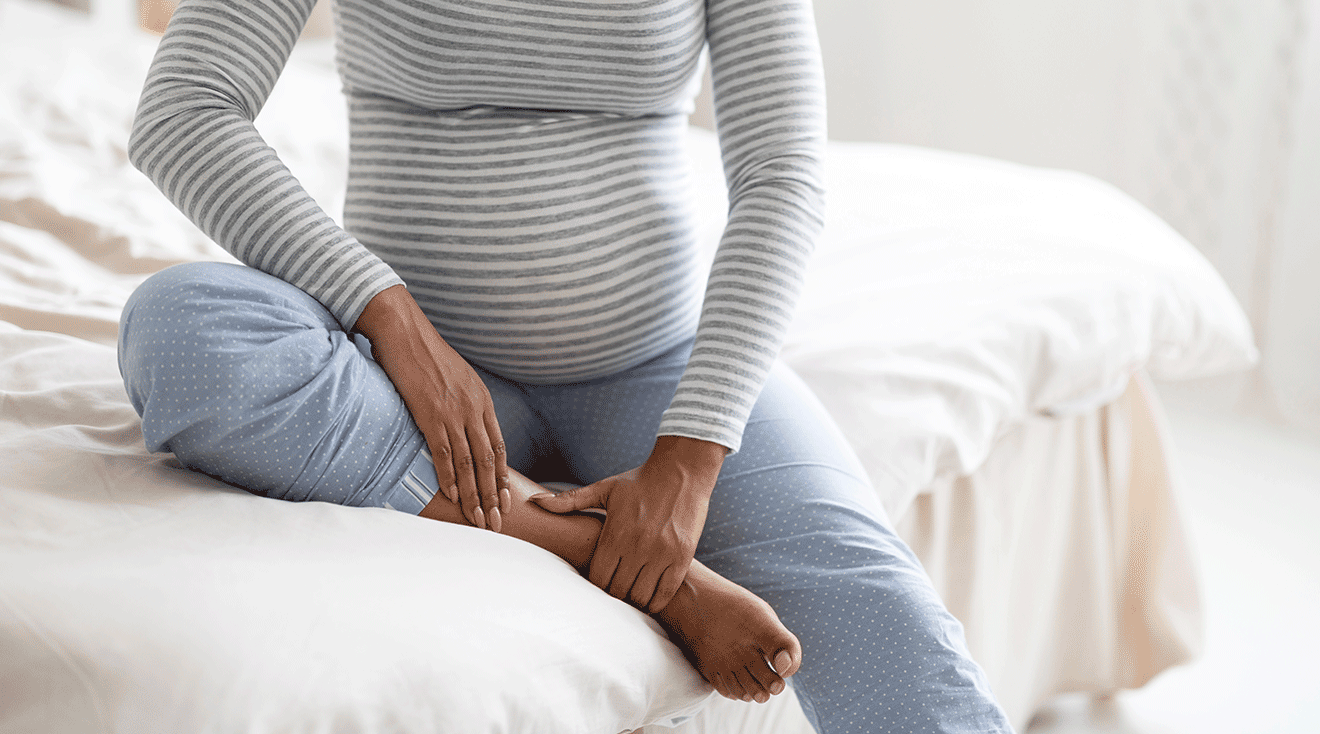Why You Might Have Leg Pain During Pregnancy (and How to Deal)
When you’re pregnant, it’s only natural to assume you’ll experience some unusual aches and pains, especially around your growing belly. But leg pain can catch you off guard. Don’t panic if you experience this—it’s a common side effect. Still, there are a few things you should be aware of when it comes to leg pain during pregnancy. Here’s what you need to know.
There are actually a lot of different reasons why you might be experiencing leg pain during pregnancy, and the kind of pain you experience can vary as well, says Frederick Friedman, Jr., MD, associate professor of obstetrics, gynecology, and reproductive science at the Icahn School of Medicine at Mount Sinai in New York City. “In pregnancy, calf pains resulting from muscle spasms–aka ‘charley horses’—are fairly common,” he says. It’s not clear why these happen, he adds, but it could be due to muscle fatigue and build-up of lactic acid, which can increase in your muscles during exercise.
Leg pain during pregnancy can also be caused by compression of certain nerves in your legs, your joints relaxing as your pregnancy progresses, an increase in your weight, swelling, and “natural changes in your posture as the baby grows,” says Julie Lamppa, APRN, CNM, a certified nurse midwife at Mayo Clinic. Varicose veins, which can increase or show up during pregnancy, “can also cause leg discomfort for some women,” Lamppa says.
A less common but concerning possible cause of leg pain during pregnancy is a blood clot or deep vein thrombosis (DVT). “This occurs most commonly in the back of the calf and it causes pain and swelling in the affected leg,” Lamppa says. “This will affect only one leg, whereas normal swelling in pregnancy will generally be even in both legs.” If you notice signs of DVT, it’s important to seek medical care right away. “DVTs can be very serious and they need prompt treatment. Women who are pregnant or newly postpartum are at particular risk,” Lamppa says. DVTs can occur in either leg, but they’re much more common on the left side vs. the right side, Friedman says. The reason for this is “uncertain,” he says, but it might be due to greater compression of the left deep veins by your growing uterus.
You don’t need to just suffer through leg pain during pregnancy—there are both home remedies and medication you can take to help.
If you’re experiencing pain, Lamppa recommends taking a warm bath before bed and gently stretching your legs. Making sure you’re well hydrated and elevating your legs when you can may also help relieve some leg pain, Friedman says. And, if you’re able, try to avoid sitting or standing for long periods of time.
If those remedies don’t work, acetaminophen (Tylenol) is considered safe during pregnancy, Lamppa says. If swelling is causing you pain, she recommends wearing compression stockings. If cramping is an issue for you, Lamppa suggests talking to your care provider about taking a magnesium supplement.
It’s always a good idea to at least mention leg pain to your care provider during your regular checkups, but Friedman says it’s especially important to see your doctor if you have any pain that persists or gets worse. If you have a “sudden, significant difference in leg size” or you can see a “rope-like” structure in your calf, Friedman recommends calling your doctor right away, as they could be signs of DVT.
In general, using “good body mechanics” when you’re walking, exercising and lifting is important, Lamppa says. “You don’t want to make pain worse by injuring your joints or pulling muscles,” she adds. Exercising regularly is “almost always beneficial,” Lamppa says.
While most forms of exercise can help with leg pain during pregnancy, leg exercises like walking, using a stair machine, stationary cycling and using an elliptical machine “are likely to be beneficial,” Friedman says.
On the dietary side, Lamppa recommends lowering your sodium and caffeine intake and increasing how much water you drink regularly. Overall, striving for a “balanced diet” may help reduce your leg pain, Friedman says.
If leg pain is bothering you, don’t hesitate to flag it for your medical care provider. They should be able to help offer up individualized tips to help you feel more comfortable.
Updated February 2020
Expert bios:
Frederick Friedman, Jr., MD, is an associate professor of obstetrics, gynecology, and reproductive science at the Icahn School of Medicine at Mount Sinai in New York City. He serves as director for both the division of obstetrics and the division of generalists in the department of obstetrics, gynecology and reproductive science at the Mount Sinai Health System.
Julie Lamppa, APRN, CNM, is a certified nurse midwife at Mayo Clinic in Rochester, Minnesota.
Please note: The Bump and the materials and information it contains are not intended to, and do not constitute, medical or other health advice or diagnosis and should not be used as such. You should always consult with a qualified physician or health professional about your specific circumstances.
Plus, more from The Bump:
Navigate forward to interact with the calendar and select a date. Press the question mark key to get the keyboard shortcuts for changing dates.




















































